the goldilocks zone of societal participation lies in knowing what you don't know
how to win personal agency and influence civilization
“entranced by their need to know WHAT to think, their inability to know HOW to think left them vulnerable to domination by demagogues and the dissolution of a free society and so, born citizens, they died subjects.”
-the epitaph you do not want
the hallmark of the modern age is a firehose of information and emotion that both invites and demands that you have an opinion on everything. every issue is someone’s hobbyhorse or hot button and in the attention economy, the issue du jour rapidly crowds out all others. more and more, the desire to remain relevant in a world of ever shifting obsession creates a drive toward a presumption that we not only need to have an opinion, but worse, that we possess a basis for one.
at a stroke this both demands and serves as enabler for a captured class with strident views and low information.
this finds uneasy confluence with the idea of technocracy and other such “rule by experts” who peddle imposed “solutions” and seemingly always seek to “do something” that more often than not is sold as “for you” when it is in fact “to you.”
emotion demands action and this bias toward stepping in with loud, simple solutions rather than nuanced comprehension and considered calculation instils not just a need to generate an overblown sense of emergencies but a desire to handle them badly and a distrust of the very processes that would allow for their effective analysis and mitigation.
the “emergency” itself is put forward in a fashion calculated to prevent any from questioning whether it is, in fact, a matter that warrants attention and response. "everything i want” is rendered calamity to ensure its prominence of place. everything is a crisis. everything a war.
coming to terms with this emergent property of the modern age will be one of the important societal processes of our time.
we all want to act like we know that which we do not know so that we can assuage our emotional need to “do something” about a set of “crises” that were mostly not crises at all until our poorly calibrated responses made them so.
and this is no way to live.
this sort of false knowledge closure is as dangerous as it is seductive. we presume we know things with which we have, at best, passing familiarity, because doing so lets us join an emotional arousal state in a tribe and doing that feels good. being left out feels bad. worse, it feels vulnerable because a large, high emotion mass of people near you is dangerous to anything outside it. you need to be in the crowd to feel safe from having it turn on you.
but joining the whipped up emotive mob as a socialization and protection modality is not a sound basis for society or civilization. (one might even go so far as to claim the inverse: that the purpose of society is to prevent this sort of rule by mob intimidation.) certainly, it is not the route to peace or human flourishing. it’s just concatenated crisis as you surge from wave to wave of poorly considered performative mania. this makes you incredibly easy to manipulate and ready prey for demagogues and dingbats.
if we would prevent our society from being consumed by this recursive agitariat reflex we’re going to need to install some firewalls and to do so requires some thinking about thinking. the first basic salient is this:
it’s hard to really have high confidence in the truth of matters if you do not have strong grounding in and personal experience with them.
you’re left at the mercy of “experts” who may or may not have any idea what they are talking about and may or may not be willing to tell you the truth even if they happen to know it. you’re surrounded by mobs who repeat or refute them with varying degrees of authority or discernment and these mobs pivot purported expertise with dizzying speed and utter conviction.
mostly, they are deluded NPC’s and simply playing performative roles of joining the jingoistic choruses of virtue signaling sing alongs that characterize much of the human zeitgeist.
monkey see money do is a foundational aspect of civilization, but taken too far, it becomes its antithesis or even its destroyer.
therein lies the problem space.
there are whole fields related to decision theory and how to know when you know enough to make good choices. if folks knew more about this discipline, they would realize how half-cocked they are most of the time and how open to manipulation, co-optation, and abuse this leaves them.
the path to avoiding this is simple to state but difficult in practice.
precept 1:
stop adopting strong views on topics where you have little knowledge.
learn to say “i don’t know” and to keep an open mind. choosing a side of a debate before having a real familiarity with the facts is the enemy of understanding. it’s emotionally easy, especially in and around “charged” topics, but this is all the more reason to resist such tendencies.
always pause and ask: am i rushing to decision/opinion closure? why am i so outraged about some thing i just heard about? is it even real/true/important?
and why am i considering messages and plans that call me to action here, particularly action that would oppose or subvert the agency of others, many of whom are more informed and more personally involved in this issue that i am?
precept 2:
err on the side of respecting rights, the agency of others, and non-involvement.
the base prior is always “do nothing.” we should act for a purpose and with intention. have not just a reason for what you do but a reason that anything needed to be done in the first place (and that latter one is an easy mistake to make when others are running around screaming “crisis! crisis! crisis!”)
blundering around trying to fix problems (that may or may not even BE problems) that you do not understand by using tools that you have no idea how to wield is not a recipe for success. it’s how you get your problems to multiply like rabbits on a swingers cruise.
the admonitions about “charged” topics above go double here.
precept 3:
think for yourself and learn to know when you you know enough to make choices or hold strong views.
knowing WHEN a strong opinion is warranted is, in most cases, more important than knowing which opinion to have. no equity investor has an opinion on every stock. the successful ones develop high conviction ideas where they know that they know and focus on those. this process holds for everything from choosing whom to marry to voting and from buying a car to coming to a view about invading iraq.
this is all sort of obvious when you say it, and yet we do it SO rarely and so many are so frequently caught up in emotional herd thinking. you spend 2 months researching which dishwasher to buy but you jump on the geopolitical bandwagon of “let’s go invade kerblackistan because they probably did bad stuff to maybe good people i only just learned of the existence of” because of a histrionic headline and some strident neighbors or social media pals.
suddenly, you’re acting like you’re an expert on a topic in which you literally know next to nothing.
can there be a surer recipe for disaster?
perhaps worse, can there be a surer recipe for ongoing delusion and manipulation?
because once you take a side and jump into the fray, it’s MUCH harder to change your mind and demagogues have you hooked. “as you all know” is a wonderful phrase or implication that preys on your having made allegiance to a stance you do not understand. you now have to adopt the rest of that stance or repudiate your prior position and when you don’t know and of the real facts in the first place, it’s hard to have the conviction to do that.
getting caught out on the limb of “strong opinion” while not knowing the facts is quite a nasty little trap.
this sort of “fished in” inescapable tribalism is exactly where a demagogue wants you. it’s a society in a low function state of manipulation, not a high function state of discernment and independence. you have made yourself into intellectual chattel by pretending to knowledge and discernment which you did not possess.
and that is no way to live.
there is a profound goldilocks zone here. all civilization to some degree depends upon the subsuming of the individual into a set of cultural and behavioral norms. this means going with the flow and doing as the others do. but take this too far, and you have eroded the sound basis FOR a civilization and become an ever surging mob, fickle and violent as it falls into the grooves of serving base human needs and jingoistic tribalism, often by attacking others.
it is very, very easy to mistake getting caught up in the madness of crowds for being a good citizen. you think you’re promoting public safety and decency. in reality, you’re rounding up midwives and burning them because you’re tripping on bread mold. that’s society for you. always been like that. there is no fixing it.
(and if you think you have never done this, i challenge you to go read your own social media history. EVERYONE falls for this at some point.)
we must seek the balance of being apart while remaining a part.
this is no mean feat.
all outsourced thinking is a risk. we all have to do it to some extent but some humility and caution in so doing is always warranted and a trusted authority in one field can be a catastrophic fool in another. and let’s face it, if the internet is proof of anything, it’s that it will not stop them from opining.
the mob wants to be inflamed. it will systematically choose bad leaders and worse messages. that thing half way around the world that you did not even know the name of 2 weeks ago but is suddenly the BIGGEST DEAL EVER is probably not actually that big a deal. it’s probably much more complex than you realize. it has history you don’t know and the people telling you what to think, feel, and care about it are mostly agenda driven and ill informed and their noise gets amplified far above any signal of nuance or measured thought.
this is how you become a useful idiot.
the dirty secret is that you’ll really, truly think you’re being useful. but you aren’t. you’re now just an amplifier of the problem and this sort of team building and tribal loyalty test signaling is the marrow of modern social media. everyone needs a take and the agitariat does not permit apathy or sitting on sidelines despite (or quite possibly because) these represent the two sanest responses to most things.
and therein lies the crux of the matter.
i am not here to tell you what to think about the ukraine.
but let’s talk about HOW to think about the ukraine.
it’s clearly a complex matter with quite a lot of shifty history. best i can tell, the dramatis personae of this conflict has no meaningful good guys, and that 100% includes NATO. it’s an interlocking pile of bullies and frauds, instigators and profiteers stretching back to time out of mind.
i have no especially strong view apart from “this looks like a bunch of great power power games that grind all the people unfortunate enough to be near them to chunks in the gears of the machine” and much of this derives from my base prior of a deep distrust of “us vs them” nationalism and speaking of countries as though they were monolithic (russia did this, america did that) when really we are speaking of governments and using a false equivalence of “american government = america” that papers over all manner of horrors and invites and requires jingoism.
that’s about as far as i feel capable of having a well considered view.
but many (who frequently seem far less informed that i) have taken up extremely strong views and used them to support and advocate for “solutions” whose efficacy looks questionable at best (and possibly counterproductive) and that could quite plausibly be described as constituting a greater crisis in their own right than the original crisis they were intended to mitigate.
given how many of the same cast of characters are advocating for lockdown, mask up, and vaccinate everything that moves with drugs they clearly did not understand, some parallels to the covid response seem inevitable. they did not all suddenly get smart and well calibrated or honest this time.
those listened to as “experts” often seek to sustain their audiences regardless of actual expertise. the limelight is a helluva drug.
it’s a fascinating case study. in december, 14 people in the US were worried about ukraine and only 9 of them could find it on a map. now it’s a national media obsession. a few months ago, most knew the ukraine government were despotic and corrupt and in a number of cases actual, bone fide neo nazis. now they are our oldest friend and staunch defenders of freedom.
it’s like we opened a wardrobe and moved the media to narnia.
here’s a great example of how all this emotional useful idiocy and tribal call and response plays out: for those saying we must save the plucky ukraine and its brave, free people from oppressive expansionist russia who is clearly at fault here, i ask a favor: read this:
if this is full of history with which you are unfamiliar and you said “wow, i did not know that,” several times about US and NATO meddling and rugpulling in this area especially given how the US has historically responded to russian militarization of anything near to us (monroe doctrine with ukraine as cuba) might be tempted to pause and ask “should i really have such strong views here?” or “why is this a fight to pick when everything we have done has thus far made it worse?”
on the flip side, for those who, by inclination lean anti-US and say “hah, see, there is is, yankee imperialism and bias!” i now have a question: do you have any idea how much of that article is true? you just read it online. do you know the author and his intent and credibility? are you just engaging in low thought content bias confirmation? how would you even know if you were? did you even generate a standard for making such a determination?
has anyone even considered what a loss in ukraine and might do to destabilize russia and who might wind up in control and what their goals might be? people love to talk about going back in time and killing hitler. but you did, it’s not like the social movements would have gone away. who would have run germany? what if they had been worse and an actually competent general? are we so sure about which is the frying pan and which the fire?
ignorance of complexity does not make it safe to ignore complexity.
my goal here is not to convince you on ukraine. frankly, i don’t feel qualified. (and i thought that at least one person on the internet ought to say that.)
but i do have some suspicions about sudden pivots to a new topic about which few know anything from one that the meat of the bell curve finally seemed to be getting to the bottom of at just the time that that reckoning was starting to look bad for the powers that be…


at the end of the day, my goal here is to engender caution by showing you how easy it is to get these things wrong and wind up led around by the nose.
you adopt an opinion that not only is a topic important, but that it is relevant to you and that you need to have a strong opinion on it.
this provides a basis for manipulating you into seeking action.
that gets dangerous.
learning the process of thought and opinion and decision closure is the only way to stop being a useful idiot.
this requires self reflection and self awareness.
these are the habits of successful thinkers:
learn to feel the seductive pull of “crisis” and see it for what it is. decline the invitation to this presumption: that’s half the battle. chances are excellent that it is not really a crisis and that even if it is, that you have some time to work out how to feel and what to do about it. this is how you keep your wits and your perspective.
stop adopting strong views on topics where you have little knowledge. accept that you may not know and perhaps more important that pretending that you know when you do not makes you easy to manipulate and dominate. “i’m still making up my mind” is the only rational stance when faced with that you are unfamiliar.
think for yourself and learn to know when you you know enough to make choices or hold strong views. make this an actual practice. ask yourself the direct question: “how would i know that i knew enough about this topic to justify having a strong opinion?” if you have no standard for such, you’re extremely vulnerable to leaping to error and the simple habit of establishing such standards makes you far more difficult to fool.
err on the side of respecting rights, the agency of others, and non-involvement. more so than any other, this will keep you out of trouble. it’s only your business when you make it your business. that’s a choice. make it with deliberation and consideration, not as a knee jerk reflex to emotionally loaded stimuli. that’s what separates the adult from the child and the citizen from the mob.
worth noting is that they also make great questions for those professing expertise, especially “why do you believe you know enough about this topic to adopt a strong or strident opinion?” many will be unable to answer that, but those that can and do may start to warrant a more attentive listening.
if nothing else, it tends to help separate those with knowledge and expertise from those engaging in uncritical parroting.
the bottom line is that a lot of “rally around the despot” gets sold as “patriotism” and “duty.” it’s an effort to shut off and vilify discernment.
they come to you with a crisis and make emotional appeals to action and virtue. you must comply, you must sacrifice, you must get caught up in the action.
peddling non-solutions to non-problems is the stock on trade of the authoritarian firebrand.
they will invite you to take leave of logic and join the mob.
the cornerstone of free society is set by declining this offer and the capability for such repudiation lies in knowing how to think.
it’s a skill to cultivate and doing so pays great dividends personally and societally. yeah, it’s a lot of work, but consider the alternative: do you really want these people doing your thinking for you?





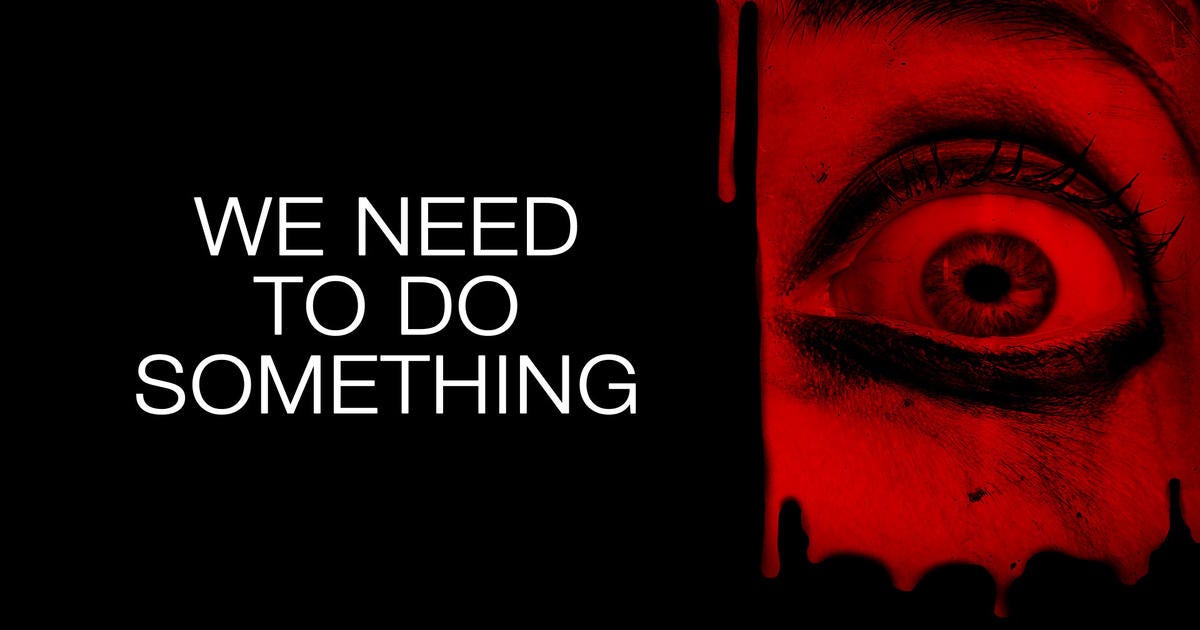
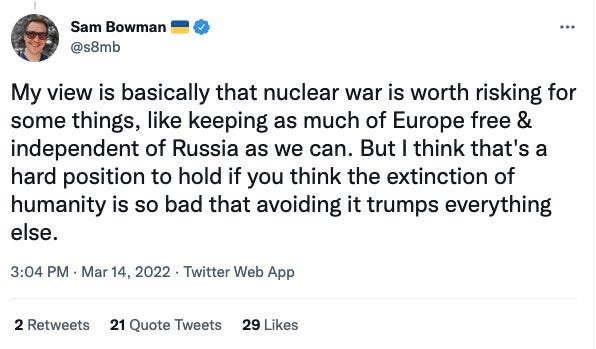
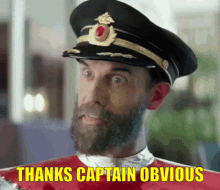



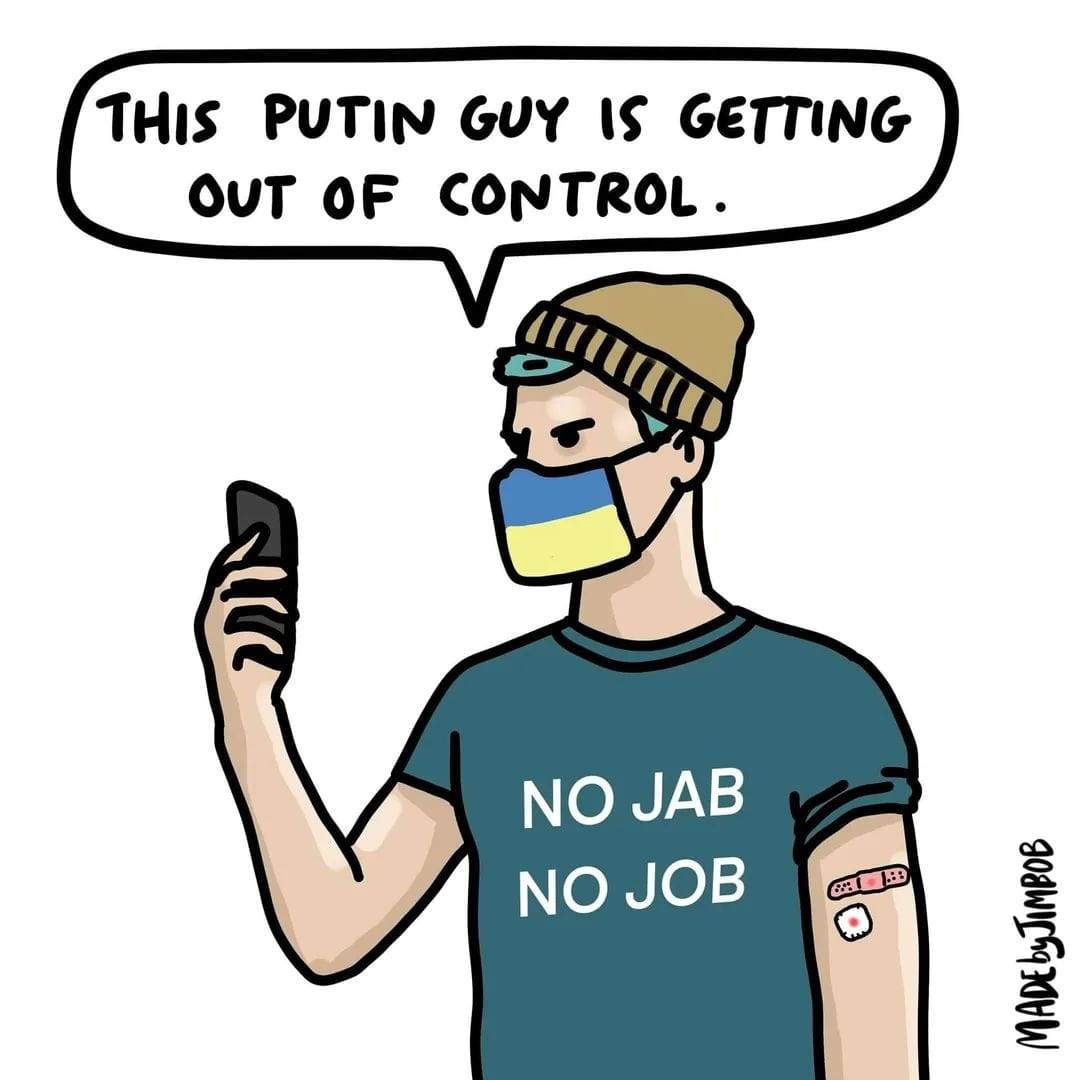
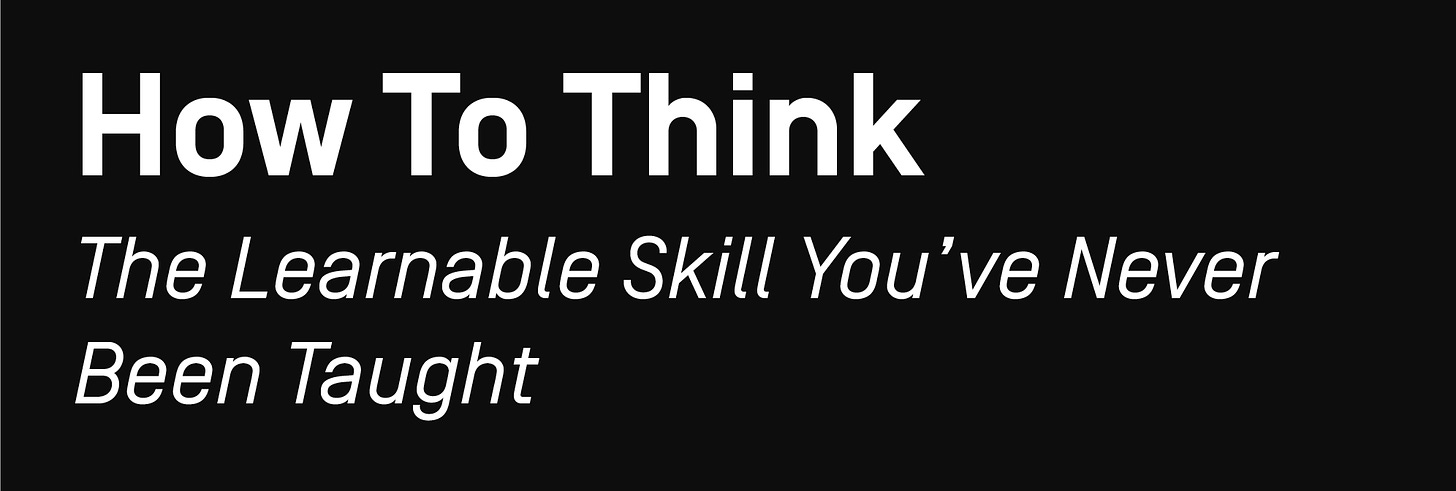
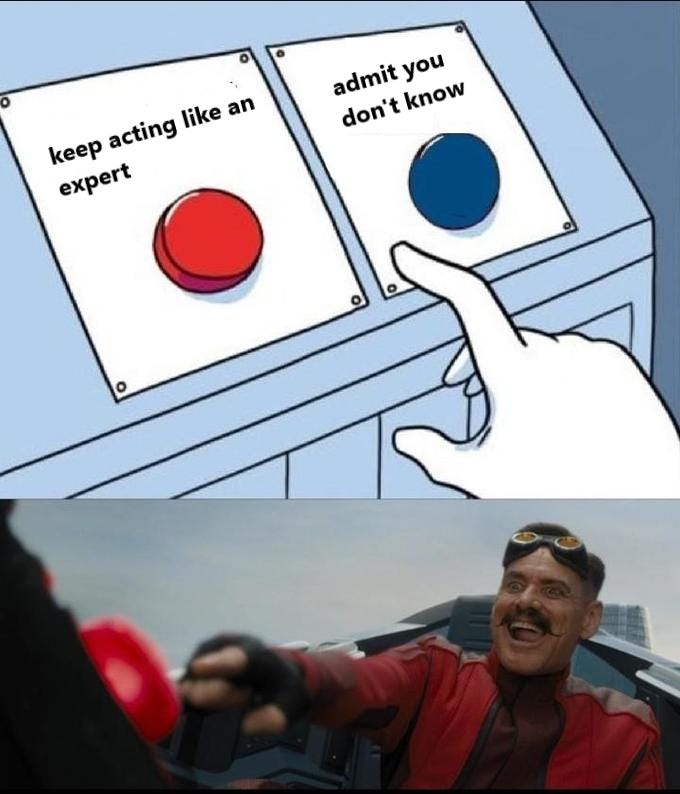
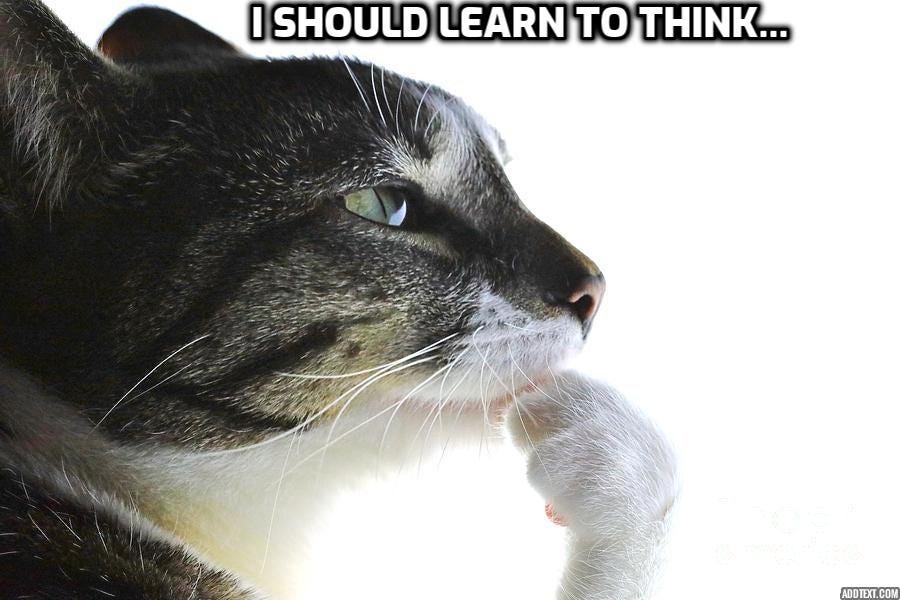
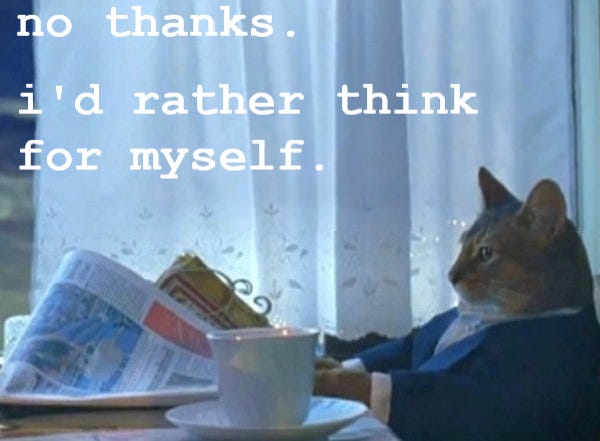
This post contains more education than 12 years of public school indoctrination. If you’re pumped full of identarian emotions and drugs, it’s hard for your prefrontal cortex to fully develop. Save the kids, Professor Gato!
Wow gato malo, you’re starting to sound like GK Chesterton! “Don’t tear down that fence until you know why it was there in the first place...” Great article.